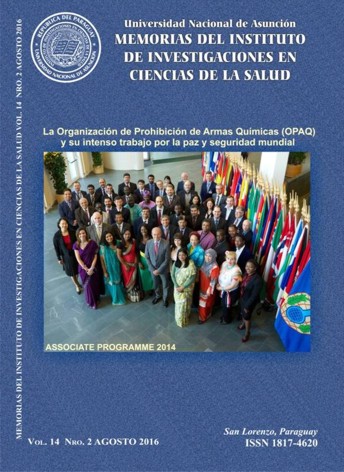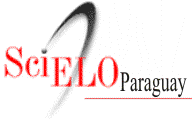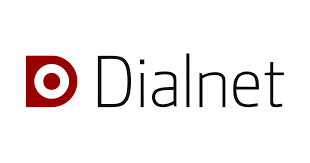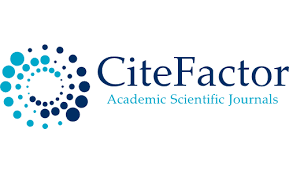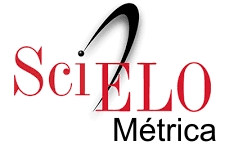Perfil clínico, hematológico y serológico en pacientes con sospecha de dengue del IICS-UNA, 2009-2013
Palabras clave:
Dengue, síntomas, IgM, perfil hematológicoResumen
El dengue constituye una de las enfermedades transmitidas por mosquitos más importante a nivel mundial. La enfermedad puede cursar con un cuadro asintomático, presentarse con un amplio rango de manifestaciones clínicas inespecíficas o cierto porcentaje puede derivar en casos graves. Este estudio observacional descriptivo de corte transverso tuvo como objetivo determinar las características clínicas, parámetros hematológicos y presencia de IgM en 92 pacientes que acudieron al IICS-UNA con sospecha clínica de dengue en el periodo 2009 al 2013. Se utilizó el MAC-ELISA desarrollado en el IICS-UNA, se registraron los datos clínicos-epidemiológicos a través de una encuesta y se determinaron los parámetros hematológicos. Se obtuvieron resultados positivos para IgM en 51/92 (55%) pacientes y resultados negativos en 41/92 (45%). Las características clínicas más frecuentes fueron: fiebre, cefalea, mialgias y artralgias. Entre los pacientes con IgM positiva, 14/51 (27%) manifestaron dolores abdominales, 19/51 (37%) reportaron letargo o postración y 20/51 (39%) declararon tener náuseas y/o vómitos, 4/51 (8%) presentaron leucopenia, 10/51 (20%) valores de hematocrito disminuido y 6/51 (12%) plaquetopenia. Sólo 13/92 (14%) pacientes declararon haber cursado con la enfermedad anteriormente. Del total de pacientes, 4/92 (4%) manifestaron haber presentado algún tipo de hemorragia. Los resultados obtenidos en el estudio refuerzan la importancia de integrar todos los parámetros posibles: detección de IgM, perfil hematológico y la clínica del paciente con sospecha de dengue para brindar un mejor diagnóstico. Así también, es necesario resaltar en cuanto a los signos de alarma para una intervención rápida a fin de evitar complicaciones.
Descargas
Citas
Bhatt S, Gething PW, Brady OJ, Messina JP, Farlow AW, Moyes CL, et al. The global distribution and burden of dengue. Nature. Nature Publishing Group, a division of Macmillan Publishers Limited. All Rights Reserved.; 2013 Apr 25;496(7446):504–7.
Guzman MG, Kouri G. Dengue: an update. Lancet Infect Dis. 2002/03/15 ed. 2002;2(1):33–42.
Burke DS, Monath TP. Flaviviruses. In: D. M. Knipe et al, editor. Fields virology. 4th ed. Philadelphia, PA.: Lippincott Williams & Wilkins; 2001. p. 1043–125.
Guzman MG, Kouri G. Dengue diagnosis, advances and challenges. Int J Infect Dis. 2004/01/21 ed. 2004;8(2):69–80.
Tricou V, Vu HTT, Quynh NVN, Nguyen CV V, Tran HT, Farrar J, et al. Comparison of two dengue NS1 rapid tests for sensitivity, specificity and relationship to viraemia and antibody responses. BMC Infect Dis. 2010;10:142.
Qiu L-W, Di B, Wen K, Wang X, Liang W, Wang Y, et al. Development of an antigen capture immunoassay based on monoclonal antibodies specific for dengue virus serotype 2 nonstructural protein 1 for early and rapid identification of dengue virus serotype 2 infections. Clin Vaccine Immunol. 2008/11/21 ed. 2009;16(1):88–95.
Tesh RB, Travassos da Rosa APA, Guzman H, Araujo TP, Xiao S-Y. Immunization with Heterologous Flaviviruses Protective Against Fatal West Nile Encephalitis. Emerg Infect Dis. Centers for Disease Control and Prevention; 2002 Mar;8(3):245–51.
Calisher CH, Karabatsos N, Dalrymple JM, Shope RE, Porterfield JS, Westaway EG, et al. Antigenic relationships between flaviviruses as determined by cross-neutralization tests with polyclonal antisera. J Gen Virol. 1989;70(1):37–43.
Crill WD, Chang G-JJ. Localization and characterization of flavivirus envelope glycoprotein cross-reactive epitopes. J Virol. 2004;78(24):13975–86.
Wang SM, Sekaran SD. Evaluation of a commercial SD dengue virus NS1 antigen capture enzyme-linked immunosorbent assay kit for early diagnosis of dengue virus infection. J Clin Microbiol. 2010 Aug;48(8):2793–7.
Guzman MG, Jaenisch T, Gaczkowski R, Ty Hang VT, Sekaran SD, Kroeger A, et al. Multi-country evaluation of the sensitivity and specificity of two commercially-available NS1 ELISA assays for dengue diagnosis. PLoS Negl Trop Dis. 2010/09/09 ed. 2010;4(8).
Rathakrishnan A, Sekaran SD. New development in the diagnosis of dengue infections. Expert Opin Med Diagn. 2013;7(1):99–112.
PAHO-WHO. Number of Reported Cases of Dengue and Severe Dengue (SD) in the Americas, by Country - June 17, 2016 (EW 22). 2016.
Martins V do CA, Bastos M de S, Ramasawmy R, Figueiredo RP de, Gimaque JBL, Braga WSM, et al. Clinical and virological descriptive study in the 2011 outbreak of dengue in the amazonas, Brazil. PLoS One. Public Library of Science; 2014 Jan;9(6):e100535.
Anand AM, Sistla S, Dhodapkar R, Hamide A, Biswal N, Srinivasan B. Evaluation of NS1 Antigen Detection for Early Diagnosis of Dengue in a Tertiary Hospital in Southern India. J Clin Diagn Res. JCDR Research & Publications Private Limited; 2016 Apr;10(4):1–4.
Gianella A, Ávila C, Chávez K, Loayza R. Trombocitopenia asociada a la infección por el virus del dengue. Rev Enfermedades Infecc y Trop. 2009;1(1):64.
WHO. Comprehensive guidelines for prevention and control of dengue and dengue haemorrhagic fever. Revised and expanded edition . New Delhi, India: Regional Office for South-East Asia.; 2011.
Rigau-Perez JG, Clark GG, Gubler DJ, Reiter P, Sanders EJ, Vorndam A V. Dengue and dengue haemorrhagic fever. Lancet. 1998/09/30 ed. 1998;352(9132):971–7.
Fischer DB, Halstead SB. Observations related to pathogenesis of dengue hemorrhagic fever. V. Examination of agspecific sequential infection rates using a mathematical model. Yale J Biol Med. 1970/04/01 ed. 1970;42(5):329–49.
Halstead SB. Antibody, macrophages, dengue virus infection, shock, and hemorrhage: a pathogenetic cascade. Rev Infect Dis. 1989/05/01 ed. 1989;11 Suppl 4:S830–9.
Guzman MG, Kouri G. Dengue haemorrhagic fever integral hypothesis: confirming observations, 1987-2007. Trans R Soc Trop Med Hyg. 2008/04/19 ed. 2008;102(6):522–3.
WHO, TDR/WHO. Dengue: Guidelines for Diagnosis, Treatment, Prevention and Control. New. Geneva: TDR/WHO; 2009.
Chen X, Chen R, Gu W, He J, Cai W, Li J, et al. Clinical evaluation of dengue RNA, NS1, and IgM for diagnosis of dengue in Southern China. J Med Virol. 2016 Jan;88(1):28–34.
Lakshmi P, Nainar P. Challenges in the early diagnosis of dengue: A practical approach. J Sci Soc. 2014 May 1;41(2):85–8.
Makroo RN, Raina V, Kumar P, Kanth RK. Role of platelet transfusion in the management of dengue patients in a tertiary care hospital. Asian J Transfus Sci. Medknow Publications; 2007 Jan;1(1):4–7.
Butt N, Abbassi A, Munir SM, Ahmad SM, Sheikh QH. Haematological and biochemical indicators for the early diagnosis of dengue viral infection. J Coll Physicians Surg Pak. 2008 May;18(5):282–5.
Rashmi M, Hamsaveena H. Haematological and biochemical markers as predictors of dengue infection. Malaysian J Pathol. 2015;37(3):247–51.
Meena K, Jelia S, Meena S, Arif M, Ajmera D, Jatav V. A study of hematological profile in dengue fever at tertiary care center, Kota Rajasthan, India. Int J Adv Med. 2016;3(3):621–4.
